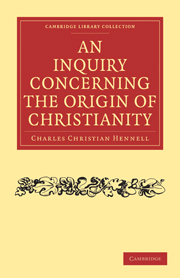Book contents
- Frontmatter
- PREFACE
- Contents
- ERRATA
- CHAPTER I Historical sketch, from the Babylonish captivity to the death of Jesus
- CHAPTER II Historical sketch, continued to the end of the first century
- CHAPTER III On the date and credibility of the Gospel of Matthew
- CHAPTER IV On the date and credibility of the Gospel of Mark
- CHAPTER V On the date and credibility of the Gospel of Luke
- CHAPTER VI On the date and credibility of the Gospel of John
- CHAPTER VII Examination of the accounts of the Resurrection and Ascension
- CHAPTER VIII Remarks on the other miracles in the four Gospels
- CHAPTER IX General objections to the miracles of Jesus
- CHAPTER X Remarks on the miracles in the Acts of the Apostles
- CHAPTER XI On the evidence afforded to the miracles by the apostolic writings
- CHAPTER XII On the prophecies
- CHAPTER XIII On the parts of Isaiah supposed to relate to Christ
- CHAPTER XIV On the book of Daniel
- CHAPTER XV Whether Jesus foretold his own death and resurrection
- CHAPTER XVI On the character, views, and doctrine of Jesus
- CHAPTER XVII Comparison of the precepts of Jesus with the Jewish writings
- CHAPTER XVIII Concluding reflections
- APPENDIX
CHAPTER VIII - Remarks on the other miracles in the four Gospels
Published online by Cambridge University Press: 05 March 2012
- Frontmatter
- PREFACE
- Contents
- ERRATA
- CHAPTER I Historical sketch, from the Babylonish captivity to the death of Jesus
- CHAPTER II Historical sketch, continued to the end of the first century
- CHAPTER III On the date and credibility of the Gospel of Matthew
- CHAPTER IV On the date and credibility of the Gospel of Mark
- CHAPTER V On the date and credibility of the Gospel of Luke
- CHAPTER VI On the date and credibility of the Gospel of John
- CHAPTER VII Examination of the accounts of the Resurrection and Ascension
- CHAPTER VIII Remarks on the other miracles in the four Gospels
- CHAPTER IX General objections to the miracles of Jesus
- CHAPTER X Remarks on the miracles in the Acts of the Apostles
- CHAPTER XI On the evidence afforded to the miracles by the apostolic writings
- CHAPTER XII On the prophecies
- CHAPTER XIII On the parts of Isaiah supposed to relate to Christ
- CHAPTER XIV On the book of Daniel
- CHAPTER XV Whether Jesus foretold his own death and resurrection
- CHAPTER XVI On the character, views, and doctrine of Jesus
- CHAPTER XVII Comparison of the precepts of Jesus with the Jewish writings
- CHAPTER XVIII Concluding reflections
- APPENDIX
Summary
In common life marvellous tales are often met with, which, on taking the trouble to trace them back through various stages to their source, we find to have originated in something perfectly intelligible and natural. And when we have done this in some instances, we conclude that the same result would follow in the case of similar tales, coming to us through the same channels, although in this latter case we might not have the means of following up such a tedious investigation.
For instance,—Irenæus says “There were some who had heard Polycarp relate, how St. John, going one day to the bath in Ephesus, and finding the heretic Cerinthus in it, started back instantly without bathing, crying out, Let us run away, lest the bath should fall upon us while Cerinthus, the enemy of truth, is in it.” Iren. 1. iii. c. 3. Epiphanius tells the same story of Ebion, and adds that, “St. John had never before made use of the public baths, till he was sent thither on this occasion by divine inspiration, to give this open testimony of his detestation of heresy.” Feuardentius, in his notes on this passage of Ireneeus, says that Jerome, in his treatise against the Luciferians, affirms that “immediately after the retreat of St. John, the bath actually fell down, and crushed Cerinthus to death.” An ordinary event is thus grown into a miracle of some magnitude.
There is no reason why we should not apply the same mode of investigation to the narratives of the writers preceding Irenæus, viz. those of the New Testament.
- Type
- Chapter
- Information
- An Inquiry Concerning the Origin of Christianity , pp. 154 - 184Publisher: Cambridge University PressPrint publication year: 2010First published in: 1838



